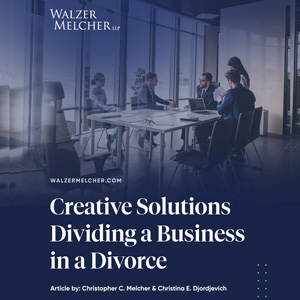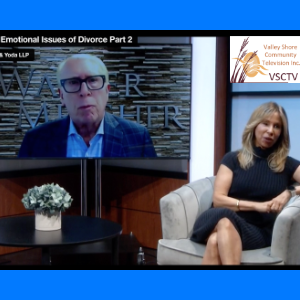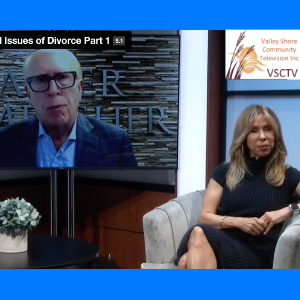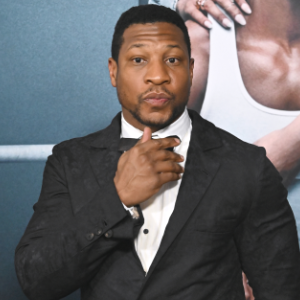
Direct Examination of Celebrity Lawyer Peter M. Walzer Part 2
[Source: BHBA]
Celebrity lawyer Peter M. Walzer, who is ranked as a best family law attorney in CA, discusses how he started his own firm, approaches divorce cases, and how he helps clients solve problems on BHBA Family Law Presents Direct Examination Part 2.
Dan:
Welcome back to another episode of BHBA Family Law Presents Direct Examination with Dan Bemel and Lauren Youngman.
Today we welcome Peter M. Walzer from top family law firm Walzer Melcher Yoda LLP in Los Angeles, California for part 2 of his direct examination interview.
Lauren:
All right. Well I want to take a step back because you basically preempted my question, which was going to be did you want to ever follow in his(your Dad’s) footsteps? We know that’s where you ended up, but when you were growing up and you looked at what he was doing, what did you want to do instead?
Peter:
I wanted to be a scientist. Specifically, I wanted to be a chemist. And at age 11 my dad bought me all these college chemistry texts, which I went through and I loved them, but I never had the math ability to really do that. So I basically tried everything else and decided to go to law school when I couldn’t figure out what I wanted to do. And then it just sort of happened. So it was an accidental lawyer I would say.
Dan:
So after law school, what was the first thing that you did? If it was an accident coming in, what was it going out?
How Peter Started His Firm
Peter:
I opened up my own office in Westwood. I shared an office with Ra Zuckerman. It was 200 a month. We split the rent and split a secretary. It was at the corner of Wilshire and Westwood Boulevard and I just took off and knocked on the door of every lawyer on my floor. And we had some interesting, rather famous lawyers on that floor and said, “I need contract work.” And that’s what I did. And I got beaten up by a few and a few gave me work and it was trial and error.
Lauren:
What prompted you to go out on your own as opposed to getting a government job or working in a firm?
Peter:
Well, I guess after working as a clerk for my dad, I said I’d never worked for anybody again.
Dan:
But you went back. So how did you end up working with your dad as an attorney?
Peter:
Well, after 10 years I got to a certain level and you get middle level cases and I wanted to go to the next level, the big cases, the business valuation, the more interesting stuff. And I knew he had two more years of practice, two years before he was going to retire. This was in 1992 I think. And I just said give it a try. And it was intense. I mean for the first year it was like my greatest fear. But we came to terms and it really did lift me into a whole different world. It was great.
Dan:
How did it change your relationship with him?
Peter:
I think, I mean it was good. We were close on that level of sharing, I would call it the service, the worry about being a family lawyer where you get a bunch of family lawyers and they all start talking and we could share our mutual misery. And he really understood our struggles, getting paid, dealing with clients who didn’t always follow the program, challenging judicial officers, the system, all of that, the things that nagged us to keep us awake at night. He was a great buddy, colleague, understood it and didn’t have any answers, but he sure could share stories about it.
Lauren:
So at this time, had you already gone out and gotten your psychology degree?
Peter:
I got that, yeah. I had got a degree in psychology about that same time, and that was another diversion, learning about Gestalt, rationally motive therapy, basically all these different therapy modalities helped me and it helped my clients could understand them better, how to listen. Basically, they know the answer to most of their problems, they just need to figure it out themselves and you need to bring it out. And that was one of the good principles that I didn’t have to have every answer. In fact, most times they knew. They just were resistant to face the reality.
Dan:
At this point in your career, what other mentors had the biggest impact on your development as attorney?
Peter Walzer’s Mentors
Peter: My dad introduced me to Ron Granberg, who was just an amazing lawyer, fellow of the American Academy of Matrimonial Lawyers. Lived in a small town called Salinas near Monterey. And again, he was a renaissance man. Not only did he play the blues, which I loved and we’d play guitar together, but he could speak, he could write. He was a fabulous lawyer, understands every nuance of tracing, Moore-Marsden, the whole family law gamut. And he’s a great entertainer and speaker. In fact, he had a band called the Quadro Phonics, which were played at an academy meeting in Monterey. And to me, he’s a star. Jan Gabrielson, I mentioned him, wrote a book about the practical family lawyer, was my dad’s partner, a good friend, climbing buddy, fabulous lawyer. Unfortunately he retired. Fortunately for him, unfortunately for me. But great guys still around some of the others. Boy, I forgot my list. I had a whole list, Chris Melcher.
Dan:
We’ll get to Chris. We’ll get to Chris.
Peter:
Okay. You’ll get to Chris.
Dan:
Yes. Enough on Chris. Yeah.
Peter:
Good.
Lauren:
Well, what about going through your own divorce around this time? What did you learn from that process?
Learning from Divorce
Peter: I learned how incredibly painful it is, seeing it through the client’s eyes. I learned that it’s after the title of a great book by Abigail Trafford called Crazy Time, what it meant. And we go through these processes, these stages, anger, grief, depression, guilt. But what I learned going through the process is you go them all at the same time, in the same day, in the same hour. It’s not like you go through one stage and you go to the next, a month later it’s like right at the same time. And I also understood how great having a good divorce lawyer was. My divorce lawyer was a certified family law specialist, Joan Bowman, she was on my floor in Century City and she was a lifesaver. I mean really kept me from doing stupid stuff.
Dan:
What specifically did she do?
Peter:
I mean she just said, “Peter, don’t do that.”
Dan:
Did it change in her approach with you and going through it generally change how you approach cases or how you counsel clients?
How Peter Approaches Divorce Cases
Peter: Yeah, definitely. I mean not getting frustrated with them, understanding what they’re going through, being patient. There’s an emotional timeline. There may be a timeline for the court where you got to do your disclosures, you got to do your discovery, you’ve got to get to a mediation or a trial. But there’s an emotional timeline that you’ve got, there’s two clients going through one on your side and one on the other side. And that sometimes you just got to wait it out till they’re ready to make the move and they always get there, some longer than others, but you got to know when to hold them and you got to know when to fold them.
And sometimes you can push, push, push, but they’re not ready. They won’t get you the documents, they won’t do their income expense declaration. They won’t follow through. Well when they want to be done, they’ll do all that. And the judges are saying, “Why can’t you get this done?” Well, you can’t tell them, “Well, client’s not ready. They’re still stuck in their marriage.” Maybe they unconsciously don’t want to get a divorce and may, I mean, what’s good about divorce, you’re going to see your kids half the time, you’re going to have half the amount of money, you’re going to have half the amount of income, nothing good about it. And we’re leading them to that place. So if there’s some resistance, yeah, that’s pretty obvious, right.
Dan:
Do you share your story with clients?
Peter:
I do. Sometimes I regret it. It’s like they don’t want to hear about me, they want to hear about them. So I’m try to be discreet, but I do like to show, hey, I can relate, but there’s so much in their world of pain. I don’t know if they care what you say, but I do share it and try to get them to see that I am understanding of it, but they need to go through their own process.
Effective Books on Divorce
My process’s not going to help them really. Sometimes I’ll give them the book. I mean a couple of books, Crazy Time by Abigail Trafford, Mom’s House, Dad’s House by Isalina Ricci are classics, and I give those to them. Sometimes that book called Splitting, Dealing with Borderline Personalities and Narcissists in Divorce. I’m blanking on the name of the author, but he’s a certified specialist and a psychologist. Oh, Bill Addie, a lawyer from San Diego. Those are three books that I recommend to clients, but all too often everybody thinks the other side is the narcissist and maybe they should look in the mirror.
Lauren:
No comment. What were your motivations to start your own firm and to find a partner as opposed to just being out on your own?
Peter:
I mean doing it all yourself. It’s a lonely life. I mean I just met with a young lawyer, so what are two things you’d recommend? And it was yesterday, I had lunch. I said, get some help in your office, man, whether it’s your mom or your dad, your friend. Get some help. You know, can even go virtual and get virtual helpers all around the country.
The person doesn’t need to be in L.A., but get some help and join bar associations, I mean, and live, in person, meet other lawyers. They’ll be your support, they’ll be your confidants. They’ll give you ideas. We need ideas, we need these tools of the trade like I provided you. Tips. Not everybody can know it all. So I knew I needed somebody to share ideas with somebody to how do you get business? How do you process the work? I also didn’t want to draft interrogatories anymore and discovery, but I find I’m still doing that after 40 years, so you can’t get away from it. But having Chris as a partner was a lifesaver. I mean really-
Dan:
How did you first meet Chris and what qualities, Chris obviously a great friend of our program here. How did you meet Chris and how did that partnership first develop?
How Peter met Chris Melcher
Peter: So my office is in the Valley and it’s been in the Valley since I got divorced and that’s why I moved away from Century City because I had to take my kids to school and take them home and do all that. So I had to get an office in the valley. Chris Melcher was on the floor of my first executive suite and I said, do you want to do some contract work for me? And I saw his work. He knew the code of civil procedure backwards and forwards, which every family lawyer needs to know. He knew criminal law because, and he tried cases. I think he tried a rape case when I was in an arson case while I was working with him in the beginning. So this is a guy that could try cases , knew discovery and was just a great lawyer. He just wasn’t motivated. He hadn’t found his way. So we turned out to be a perfect match. It was great.
Dan:
So then how did you first really start growing and put your foot on the gas marketing the firm, attracting clients, recruiting new talent? What were those early years like?
Peter:
I mean, I knew what to do. I just didn’t have the foundation. You may know how to build a building. I saw my dad do it, I saw how he did it and some of his lawyers, Dina Kleeman is a leader of the bar, Paula Kane, all those people my dad groomed. And so I knew how to do it. I just needed a foundation to build my building. And once I had Chris, there were two of us, you can build a foundation with two, with one it’s much harder. And once we had that stability, one of us could market and it turned out he turned out to be a good marketer. Two, he has it all.
So and then we found international family law attorney Steven Yoda about six years ago, who also has it all. So now we’ve got three of us to build an amazing foundation. So got to have the foundation, then you can start joining the organizations, meeting other lawyers, writing articles, giving seminars. That’s what my dad told me. Join, speak and write. That is going to get you business and meet the joining means, meeting other lawyers, family lawyers, non-family lawyers. Most of our cases come from family lawyers, San Francisco, San Diego, England, France, Germany, Spain, all over the world. Family lawyers need a family lawyer in Los Angeles and we’re the go-to firm.
Lauren:
What’s your approach to recruiting associates and mentoring them?
How to Find Good Lawyers
Peter: Well, I mean I hear, and it’s our experience finding lawyers is tough. And so it’s just basically word of mouth and it’s trial and error and you need so much to be a good associate and people that want to learn from the best. I mean we pay for all travel to bar meetings, whether it’s Charleston, South Carolina, whether it’s England, wherever. We sent our great family law attorney, Cynthia Ponce to Chile for a meeting and you got to be able to put in the hours and you got to be careful and you got to care about the clients and you got to be motivated and you’ve got to be a fun, interesting, totally secure, happy person. Other than that, we have no basic requirements
Dan:
Other than that. Yeah, that’s it. And bill, and you got to bill.
Peter:
You got to be good with finances in terms of understanding how to do a spreadsheet, how to do DissoMaster, calculate a Moore Marsden. I mean if you come into my office for an interview and you don’t know what Moore-Marsden is, woe be to you.
Dan:
Do you still get a rush? I want to talk about how the law has changed and how both the practice and the business of the law has changed over your time in business, but do you still get a rush out of the wins?
Helping Clients Solve Problems
Peter: I do. I mean love just once you sit in a mediation till 9:00 at night or midnight or 1:00 in the morning, which I’ve done and you resolve the people’s problems, it’s great going to court and winning, good, but often it’s not clear. There’s often a family law appeal, there’s often backlash. It is satisfying to win in court, but often resolving it out of court with our private judicial officer mediators is just as satisfying, sometimes more, because it’s solidified. You’ve got a sure deal, you win in court, there’s a lot of post court backlash that you may suffer from. But yeah, all that’s great and you love, we love serving the clients. That’s what we’re doing it for. I mean basically I’ve talked about me, but it’s all about the client. It’s helping them solve a problem and we’re problem solvers.
Dan:
And what are the other side? Do the losses sting, do you carry them with you? How do you deal with that?
Peter:
Yeah, you go out and surf, rock climb, jump off a cliff, whatever you want to do.
Lauren:
Meditate.
Peter:
Meditate. It’s painful. I mean, and a client, not every case works out. Clients sometimes leave unhappy because they’re unhappy and nothing will satisfy them and that’s a loss. We haven’t done our job for whatever reason, and our services very expensive. I mean, any lawyer is expensive. We often joke and say we couldn’t afford ourselves and hopefully we won’t have to afford ourselves. But it’s hard and keeping clients happy and satisfied, happy, maybe an exaggeration, but feeling like they’re getting what they’re paying for is a very, it’s a tricky business, no doubt.
©2023 BHBA. No claims made to copyrighted material. Aired 1/20/23.
5 More posts from Peter M. Walzer on Celebrity Divorce
More on High Net Worth Divorce

Nicole Kidman & Keith Urban’s Celebrity Divorce Explained





